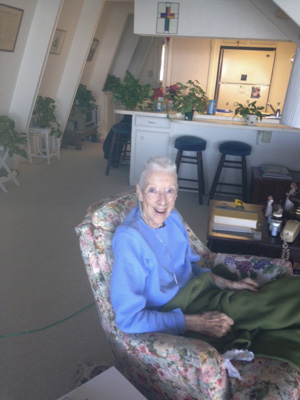WHAT’S GOING ON?
#154 MAY 2007
ALONG THE WAY
Human service is the way to divinity.
THIS MONTH’S THOUGHT
When we get to the point where we don’t react and we agree rather than defend, we have passed the third degree.
SCIENCE OF MAN Lesson Ten
(continued from last month)
Now we observe greed and its many ways of functioning. Now, of course, vanity says: “I don’t have greed. I only try to have what is essential. And I look after everybody else”. So, we will observe carefully to see greed. Then we will see vanity. So, we’re going to put all three of these down. Vanity and pride, and, of course, starting with greed, which is the parent of vanity and pride.
Now, vanity paints a very composite picture that’s only allowed to the surface: Of what a wonderful person I am. I’m better than other people. I can see where they go wrong. I can see where they have faults. And, of course, I can recognize that I have a fault or two. But, they’re all caused by circumstances. And other people make me angry. Sure, I get angry. But, it’s due to other people’s misbehavior. In other words, my anger is really righteous indignation. But other people are just plain short-tempered. They have short fuses.
So, we paint a very beautiful composite picture of self, which is called vanity, of the ability to judge others; of the ability to see how I’m better than others; of the ability to see where others have short-comings that I wouldn’t stoop to; to see how I’ve always tried to do the right thing against great odds, of course. So, we will paint this picture. This is enough to give you a start. And each of us must discover for self what one’s false picture of self really is.
And then pride is the defense of that false picture. So, we will write down all the times that we feel on the defensive. Now there is only, really, one thing to defend, unless someone has a gun or a knife after you, and I’m quite sure that that’s very infrequent, if at all, that one is on the defensive. Now, in order to expand this picture a bit, let’s go back and think of all the times that can be recalled that one has been on the defensive for the past several months. Now, we’re eliminating the times that one was threatened with a gun or a knife or a madman or a physical violence of any sort.
We’re talking about we were on the defense of our psychological motives, of our opinion of self. Someone comes in and says, “You’re forgetful”. And, of course, here comes the defense. Someone says, “You’re always late”. Here comes the defense. “Of all the things I had to do. And the car wouldn’t start.” Or a hundred and one other things to defend the fact of being late. And it’s not really I that’s late. It was other things that forced me. Circumstances made me late, if I really was late. But I was only late once or twice this whole year. And they said I was late every time. And many more of the same general idea.
We’re going to keep records of greed, vanity and pride. We’re not trying to change them. We’re not having some self-improving “Not-I” say “we’ve got to get over this.” We are looking at the propositions produced by greed, by vanity, and by pride. Now, this is all the work of the four dual basic urges, the Master called mammon, the one which the self serves. The one which when I was identified with the self, because it did not see it as an illusion, was identified in serving.
Now I, the observer, sees something as an illusion, reports that to X, and henceforth, I is not longer tempted to identify with that idea of the self that it has seen as an illusion. So, we hope, that by making very complete observations, and recording them, so they can be read and reviewed, and by writing them down, that we begin to see the ramifications of the four dual basic urges as expressed in greed, vanity, and pride. Cause if one should see clearly the illusion of the four dual basic urges, one would cease to identify with it and all the others are associated, and based upon this four dual basic urges, and its work of greed, vanity and pride. So, if one should see it, one has produced information for X that greatly enhances the possibility of the awareness being cleansed, of being made pure.
Now to observe some of the ways that the “Not-I’s”, the self, justifies itself into a state of having the unpleasant emotions. First will be that the self is observed by I, the observer, to be replaying past happenings, as they’re powerful influences to bring about the state of the unpleasant emotions. Because it generally either compares the present state as being not as good as the good ole days, or it feels sorry for itself because it had such an unhappy childhood, such an unhappy last year, or such a terrible state of illness three years ago that they didn’t think I would pull through. But, I finally made it. And it can replay it and replay it and gather all manner of self-pity as to “Oh, how sick I was three years ago, how terrible I felt.”
The whole self is always considering its being. “How does this affect me?” in everything that happens. And there are six major families of them. And each one sees everything that is happening as being opposed to it. The one that’s determined to have its way by complaining feels that nobody really pays any attention to me. Which that “Not-I” is saying, “I’ve complained and nobody did anything about it.” The one that sticks up for its rights is very belligerent and nobody gives it its rights as it thinks they are. The pleaser tries to please and people don’t appreciate it.
It tries to believe and do as told by authority and there are no rewards. You see the self is always looking for a reward. What’s in it for me?
I is looking for no reward, not interested in escaping anything because it is a function of X. It is not subject to reward or punishment. Its only difficulty is when it identifies with the self and then it is involved in the turmoil of the self, the name, the false personality, the bit of all the conflict and confusion serving mammon. Manipulated and controlled by mammon. But it is not subject to punishment. It sometimes goes to sleep and gets it in a bad place.
So each of these false “I’s is always considering self. Here’s the one that has been different for two weeks. It’s put on a good front. It’s pleased everybody. It’s been polite. It’s smiled a lot. And has not started any arguments and here “I’m not any happier than “I” was before because the other people are still going on and misbehaving like they’ve always been.”
And then, of course, the blamer always blames and thinks that everyone should apologize. So, I blamed and nobody apologized and I should have been entitled to an apology. So, you see that all the “Not-I’s” are continually building the accounts receivable that you have your records of.
When we begin to see that the whole idea of accounts receivable due the self are illusions, that nothing is due, then one is further freed from the ideas of having something due one. One no longer identifies with these ideas that they owe me that they have done terrible things to me and they should do something about it. (To be continued next month)
A STORY
It seems that now and then it becomes my turn for the body to not feel good. Of course, my spiritual pride (huge “Not-I”) tells me that I am above all that nonsense. However, there are so many lessons in the experience, I would be foolish to not embrace it.
It was interesting to watch the self in denial. The mind created hundreds of scenarios for the reason to feel bad: I overworked at the gym and that is why I ache all over. I must have eaten something that didn’t agree with me. Allergies, that was a good place to dump all symptoms out of the ordinary. My fever spiked every afternoon around 4:00, so perhaps I had malaria. And on and on.
The days passed by and each night I knew that in the morning I would feel good. I am so stubborn and hardheaded that it took two weeks before I surrendered and went to a doctor, who said I had bronchitis. Within 24 hours I was feeling fine. I really do it to myself, don’t I?
But there is still another great lesson embedded in this misery. It is possible to keep the mood and make a pleasant harmonious contribution wherever I go despite feeling wretched. I didn’t have to tell anyone my sad story and contaminate the environment with my complaining and feeling sorry for myself. Who cares, anyway? In fact, feeling miserable made it easier to stay awake and not drift off into contentment or even lower.
Am I grateful for the experience? You bet! Life continues to give me situations so I can look at my stubborn self-will (and a bunch of other things).
I am, oh, so thankful to feel good!
LIFE’S WORD
(p.22)
I require no man to give. If thou givest because thou thinkest it will please Me, know that I am already pleased with thee, and nothing which thou canst do can alter My pleasure, nor can cause My displeasure. Thou hast all favor in My sight and now and I would not have thee do anything with the object or purpose of gaining My favor.
NOTE
One of the prayers Dr. Bob used to repeat in a class went like this:
If I serve thee, oh Lord, to gain a heaven, deny me.
If I serve thee, oh Lord, to escape a hell, throw me in.
HEADLINES
p.12
Agape refers to the awareness that whatever a person is doing, has done, or will ever do, at the moment of doing the act, feels he is right and/or proper or justified. This is the criterion everyone uses. So one cannot blame another, criticize another, or feel guilty, when one is aware of the state referred to by the word “agape”.
Without agape, one is really not human, much less a spiritually evolved man.
One cannot learn agape. It doesn’t just happen. One may discover it in relationships when one is really seeing and hearing.
In order to really see and hear, one must be aware of self.
******
THOUGHTS
Change is inevitable except from vending machines.
He who dies with the most toys is nonetheless dead.
A picture is worth a thousand words but is uses up 3000 times the memory.
Consciousness is that annoying time between naps.
Depression is merely anger without enthusiasm.



